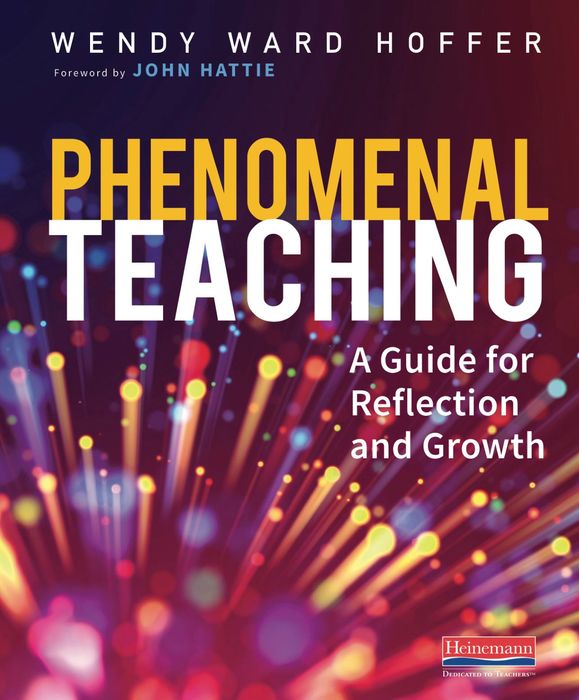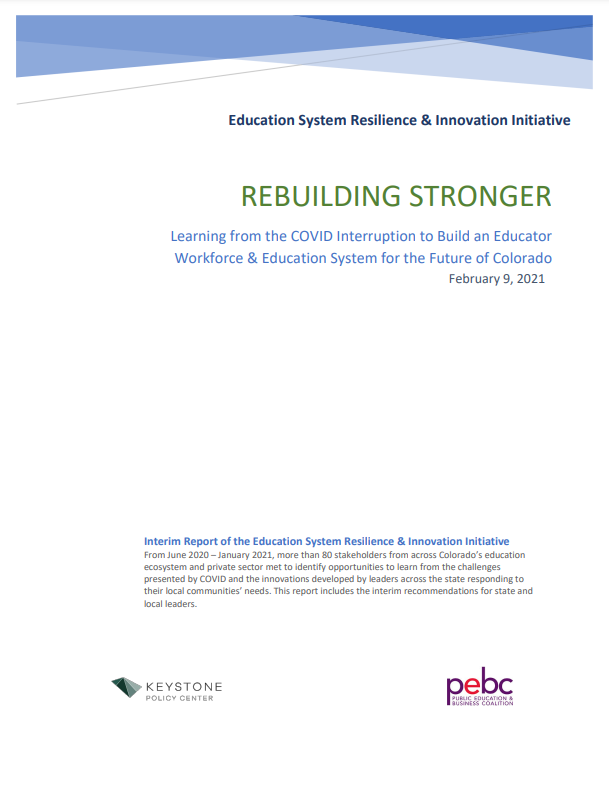New and noteworthy

Equity at School: Inclusive Instruction for Diverse Learners
PEBC’s 2023 publication “Equity at School: Inclusive Instruction for Diverse Learners" introduces readers to PEBC as an educator professional development organization dedicated to increasing opportunity for each and every learners. The paper contains PEBC’s Equity Indicators, a set of observable practices teachers can incorporate into their instruction to support students of color.
PEBC’s professional development model is a nationally recognized approach to building the capacity of educators in schools to growing and maintaining quality instruction in the classroom. These books, written by PEBC staff and friends, describe and discuss this model and the strategies that support great teaching.
Over the years, PEBC has developed a national reputation as a reliable resource for information that has been researched and developed by practitioners and policy analysts to assist educators and policy-makers in their efforts to strengthen public schools and raise student achievement.
Authors
Do you have a favorite PEBC author you'd like to meet?
Since 1983, PEBC authors have written more than thirty books about effective pedagogy based on research, study and work in schools. Our authors bring unique expertise and inspiration and are available to work with you and your colleagues on site.

Wendy Ward Hoffer, MA
Senior Director of Content Development and Publications
Wendy Ward Hoffer is the author of Phenomenal Teaching: Igniting Agency and Understanding for Each and Every Learner, Cultivating STEM Identities: Strengthening Student and teacher Mindsets in Math and Science, Developing Literate Mathematicians: A Guide for Integrating Language and Literacy Instruction into Secondary Mathematics, Minds on Mathematics: Using Math Workshop to Develop Understanding in Grades 4-8 and Science as Thinking: The Constants and Variable of Inquiry Teaching. Wendy works with teachers, schools and districts locally and nationally to promote deep thinking in math and science.
She is the creator and facilitator of several PEBC professional development institutes including: Minds on Math Institute, Science Institute, STEM Identity Institute and Foundations of Numeracy. Wendy received an MA in Science Education from Stanford University and earned National Board Certification while teaching middle school math and science.

Patrick Allen, MA
National Consultant
Colorado’s new educator evaluation system provides remarkable opportunities and complex challenges for school districts. This report reflects the initial considerations facing a metro Denver-area school district as district leaders embarked on the process of designing and piloting a new system. It is our hope that the report will benefit other districts undertaking the process of transitioning into an educator evaluation system that focuses on student learning and educator effectiveness.
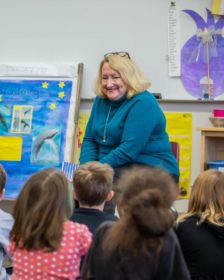
Ellin Oliver Keene, MA
Senior Consultant, Professional Learning
Ellin Oliver Keene is author of Engaging Children: Igniting a Drive for Deeper Learning, Talk About Understanding: Rethinking Classroom Talk to Enhance Comprehension, To Understand: New Horizons in Reading Comprehension, Comprehension Going Forward: Where We Are and What’s Next, and Mosaic of Thought: The Power of Comprehension Strategy Instruction.
Ellin has been a classroom teacher, staff developer, non-profit director and adjunct professor of reading and writing. In addition to her role as Director of Research and Development for PEBC, she works with schools and districts throughout the country and abroad.

Stevi Quate, PhD
National Consultant
Stevi Quate is the author of The Just-Right Challenge: 9 Strategies to Ensure Adolescents Don’t Drop Out of the Game and Clock Watchers: Six Steps to Motivating and Engaging Disengaged Students Across Content Areas (both coauthored with John McDermott).
As PEBC staff developer, Stevi sees daily the unrelenting pressure teachers face to boost student performance—and that the ability to catch students’ interest and hold it is essential to raising achievement. Stevi has also been a middle and high school teacher, co-director of the Colorado Writing Project, President of the Colorado affiliates of NCTE and IRA, and state literacy coordinator for the Colorado Department of Education.
Books by PEBC Authors
Assessing Comprehension Thinking Strategies
Ellin Oliver Keene. Shell Education 2006.
Clockwatchers: Six Steps to Motivating and Engaging Disengaged Students Across Content Area
Stevi Quate and John McDermott. Heinemann 2009.
Comprehension and Collaboration: Inquiry Circles in Action
Stephanie Harvey and Harvey Daniels, Heinemann 2009.
Comprehension Going Forward: Where We Are, What’s Next
Ellin Oliver Keene, Susan Zimmermann, Debbie Miller, Samantha Bennett, Leslie Blauman, Chryse Hutchins, Stephanie Harvey, Anne Goudvis, Brad Buhrow, Gina Cervetti, Marjorie Larner, Cris Tovani, Nancy Commins, Anne Upczak Garcia, Tanny McGregor, P. David Pearson, and Harvey Daniels. Heinemann 2011.
Conferring: The Keystone of Readers’ Workshop
Patrick Allen. Stenhouse 2009.
Cultivating STEM Identities: Strengthening Student and Teacher Mindsets in Math and Science
Wendy Ward Hoffer. Heinemann 2016.
Developing Literate Mathematicians: A Guide for Integrating Language and Literacy Instruction Into Secondary Mathematics
Wendy Ward Hoffer. National Council of Teachers of Mathematics 2016.
Engaging Children: Igniting a Drive for Deeper Learning K – 8
Ellin Oliver Keene. Heinemann 2018.
I Read It, but I Don’t Get It: Comprehension Strategy Instruction for Adolescent Readers
Cris Tovani. Stenhouse 2011.
Inquiry Illuminated: Researcher’s Workshop Across the Curriculum
Anne Goudvis, Stephanie Harvey, Brad Buhrow. Heinemann 2019.
The Inside Guide to the Reading and Writing Classroom: Strategies for Extraordinary Teaching
Leslie Blauman. Heinemann 2011.
The Just Right Challenge: 9 Strategies to Ensure Adolescents Don’t Drop Out of the Game
Stevi Quate and John McDermott. Heinemann 2013.
Learning Along the Way: Professional Development by and for Teachers
Diane Sweeney. Stenhouse 2003.
Let’s Find Out! Building Content Knowledge with Young Children
Sue Kempton. Stenhouse 2014.
The Literate Kindergarten: Where Wonder and Discovery Thrive
Sue Kempton. Heinemann 2007.
Minds on Mathematics: Using Math Workshop to Develop Deep Understanding in Grades 4 – 8
Wendy Ward Hoffer. Heinemann 2012.
Mosaic of Thought: The Power of Comprehension Strategy Instruction, Second Edition
Ellin Oliver Keene and Susan Zimmermann, Heinemann 2007.
No More Independent Reading Without Support
Debbie Miller and Barbara Moss. Heinemann 2013.
No More Telling as Teaching
Cris Tovani and Elizabeth Moje. Heinemann 2017.
No More Math Fact Frenzy
Douglas H. Clements, Julie Sarama, Linda Ruiz Davenport, Connie S. Henry. Heinemann 2019.
Non-Fiction Matters: Reading, Writing and Research in Grades 3 – 8
Stephanie Harvey, Stenhouse 1998.
Pathways: Charting a Course for Professional Learning
Marjorie Larner. Heinemann 2004.
Phenomenal Teaching: A Guide for Reflection and Growth
Wendy Ward Hoffer. Heinemann 2020.
Put Thinking to the Test
Lori Conrad, Missy Matthews, Patrick Allen, Cheryl Zimmerman. Stenhouse 2008.
Reading with Meaning: Teaching Comprehension in the Primary Grades
Debbie Miller. Stenhouse 2002.
The Right to Literacy in Secondary Schools
Edited by Suzanne Plaut. Written by PEBC staff developers, lab hosts and clients. Teachers College Press 2008.
Science as Thinking: The Constants and Variables of Inquiry Teaching
Wendy Ward Hoffer. Heinemann 2009.
Seven Keys to Comprehension: How to Help Your Kids Read It and Get It
Chryse Hutchins and Susan Zimmerman. Random House, 2003.
Standards and Assessment
Lisa Almeida, Laura Benson, Jan Christinson, Brandon Doubek, Lynn Howard, Loan Mascorro, Thomasina Piercy, Gabriel Rshaid, Steve Ventura, Maryann Wiggs. Lead + Learn Press 2011.
Strategies that Work: Teaching Comprehension for Understanding and Engagement, Third Edition
Stephanie Harvey and Anne Goodvis. Stenhouse 2007.
Talk About Understanding: Rethinking Classroom Talk to Enhance Comprehension
Ellin Oliver Keene. Heinemann 2012.
The Teacher Residency Model: Core Components for High Impact on Student Achievement
Cheryl A. Torrez (Editor), Marjori Krebs (Editor), Sarah B. Glover (Contributor), Jessamyn Lockhart (Contributor) + 21 more.
Teaching, Learning + Trauma: Responsive Practices for Holding Steady in Turbulent Times, Grades 6-12
Brooke O’Drobinak & Beth Kelley. Corwin 2020.
Teaching with Intention: Defining Beliefs, Aligning Practice, Taking Action, K-5
Debbie Miller. Stenhouse 2008.
That Workshop Book: New Systems and Structures for Classrooms That Read, Write, and Think
Samantha Bennett. Heinemann 2007.
To Understand: New Horizons in Reading Comprehension
Ellin Oliver Keene. Heinemann 2008.
Writing Through the Tween Years: Supporting Writers, Grades 3 – 6
Bruce Morgan with Deb Odom. Stenhouse 2004.

Equity at School: Inclusive Instruction for Diverse Learners
PEBC’s 2023 publication “Equity at School: Inclusive Instruction for Diverse Learners" introduces readers to PEBC as an educator professional development organization dedicated to increasing opportunity for each and every learners. The paper contains PEBC’s Equity Indicators, a set of observable practices teachers can incorporate into their instruction to support students of color.
REBUILDING STRONGER
Learning from the COVID Interruption to Build an Educator
Workforce & Education System for the Future of Colorado
The COVID-19 system interruption was felt in every aspect of Coloradans lives from how we shop and gather with friends to how business is conducted and how we take in entertainment. Perhaps the impact felt most suddenly and with potentially the most long-term implications was in our education system. The interruption has highlighted and exacerbated multiple layers of existing inequities at all levels of education.
What educators, school leaders and system leaders are continuing to experience and learn as a result of the interruption may provide additional lessons for general improvements to all aspects of our education systems, from how we structure and support the teaching workforce to how instruction is delivered.
Through six months of regular meetings, discussing challenges and successes being experienced across the state, a diverse coalition of stakeholders has identified a series of system-level changes at the state and local level to seize on the lessons learned, to strengthen our education system for the future, to improve outcomes for our students to and better support our educators.

Bringing Teacher Learning To Life – Courageous Teaching Using Peer Learning Labs to Elevate Efficacy
Teacher effectiveness remains the single most powerful influence on student achievement. To this end, educators need ongoing, rigorous learning opportunities to continuously hone their instructional practice. Real changes in instructional practice come about through professional development focused at the classroom level on student learning. Collegial conversations about classroom observations enable teachers to access ideas, uncover strategies, and identify resources. The Peer Learning Lab structure advances school based initiatives by creating opportunities for data collection and analysis, as participants study formative assessments and student work. Peer Learning Labs create a forum for the authentic learning teachers need to experience in order to grow their instructional practice.
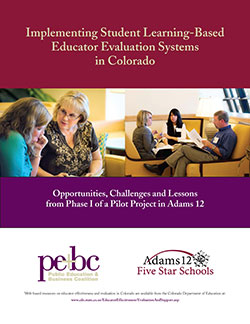
Implementing Student Learning-Based Educator Evaluation Systems in Colorado
Colorado’s new educator evaluation system provides remarkable opportunities and complex challenges for school districts. This report reflects the initial considerations facing a metro Denver-area school district as district leaders embarked on the process of designing and piloting a new system. It is our hope that the report will benefit other districts undertaking the process of transitioning into an educator evaluation system that focuses on student learning and educator effectiveness.
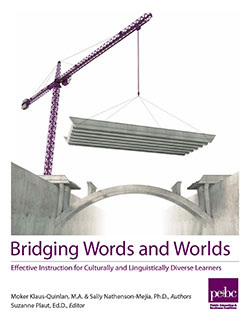
Bridging Words and Worlds
In this document, published October 2010, PEBC lays out a six-part Framework of Effective Instruction for Culturally and Linguistically Diverse Learners (“CLDL Framework”) that names key components of the teaching practice and student learning that is most central for CLD students. The framework is built around enduring understandings both for teachers and for students: what is most important for them to understand in order to be most successful in their shared endeavor.
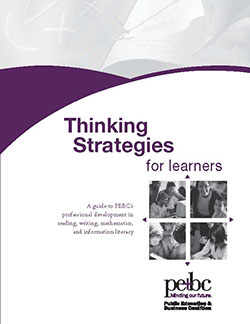
Thinking Strategies for Learners
A guide to PEBC’s professional development in reading, writing, mathematics, and information literacy. PEBC staff developers and lab classroom teachers have worked in classrooms to refine the content of our professional development model. They, along with countless teaching colleagues, school leaders and students, have broadened and deepened what it means to teach through a thinking lens. This platform was produced through the collaborative effort of many and represents our initial thinking, revised thinking, extended thinking.
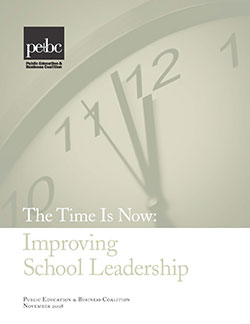
The Time Is Now: Improving School Leadership
The work of school leaders has changed dramatically. Leaders working in public schools today are being asked to do what no system has ever before accomplished: ensure that each child, every day, in every school, achieves at high levels intellectually, socially and emotionally. This paper, published November, 2008, describes the context of current school leadership in K-12 public education, and presents PEBC’s Leadership Framework as an important way to reframe school leaders’ work.

From Surviving to Thriving: Strategies for Success in a High-Stakes Accountability System
This report, published in October 2006, describes the context of current high-stakes accountability systems in K-12 public education, offers frontline recommendations for challenging and improving the system, and outlines ways in which PEBC staff development can help teachers, schools and districts not just survive—but thrive—under the high-stakes accountability system.

Investing in the Next Generation: How Education Drives Colorado’s Economic Future
The quality of Colorado’s education system, from early childhood education through K-12 and higher education, is key to its economic future and the quality of life its citizens enjoy. This 2004 report provides a foundation for establishing Colorado’s commitment to public education as an essential investment in its future and the key to maintaining its economic advantages and prosperity.

